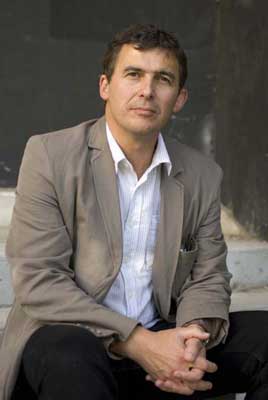Recently German Chancellor Angela Merkel sent shockwaves across the political world with the declaration that Germany had a humanitarian mission to accept refugees and that this was part of globalization. She pointed out that if so many people wanted to live in Germany, this was an honor to the whole nation and made every German proud of it. In the context however of the huge wave of refugees from devastated Syria there should be a clear distinction between political and economic immigrants.
We discussed the issue with sociologist Eric Fassin, professor at Paris-8 University and long-time expert in migration, xenophobia and racism in Europe who delivered a lecture last week at Xaspel Social Center in the city of Sofia.
 „For many years the European Union worked as mostly an economic project for a common market. The question of a single international policy of the bloc was shelved for an indefinite future. Common migration policies emerged only after 2000 when the concept of the Fortress Europe emerged. This concept represents the expropriation of traditional national policies of European countries and their transfer at the level of the European Union. But now with the Merkel declaration, the situation has changed.”
„For many years the European Union worked as mostly an economic project for a common market. The question of a single international policy of the bloc was shelved for an indefinite future. Common migration policies emerged only after 2000 when the concept of the Fortress Europe emerged. This concept represents the expropriation of traditional national policies of European countries and their transfer at the level of the European Union. But now with the Merkel declaration, the situation has changed.”
„I think that this position has the potential to generate real changes. In the first place, the quantity (500,000 refugees in Germany so far) will necessarily lead to qualitative changes in policies. This blows up the notion of our capacity. France, and certainly other countries such as Bulgaria, cannot keep silent after Germany's statement that goes like this: 'We cannot shelter all the needy of the world, but we can shelter a large part of them.' This is not the same as stated by France: 'We cannot shelter all the needy of the world' meaning 'we cannot shelter anybody.' By the way”, Eric Fassin adds, “refugees are aware of this and they do not want to go to France. This is quite obvious in the port city of Calais where they prefer to live in camps hoping to cross the Channel and reach Britain.”
„Angela Merkel offers something radically different. She presents a Germany of generosity and she is offering this image to the world, but also to Germans. Recently, a German sociologist laid out the hypothesis that Germany has become the American Dream of Europe and I think this is an interesting point of view. This positive image that refugees bring along creates confidence and self-appreciation in Germans themselves who have been troubled by an inferiority complex for decades.”
In this sense it is worthwhile comparing France and Germany. Merkel offers a positive identification to her fellow citizens, while France offers a negative one to hers. France has shrunk in an inferior self-image. The policy conducted by France is quite different and it showed in the way it treated Roma from Romania and Bulgaria. Rejecting and condemning 24,000 Roma the message that France sent to its citizens was as follows: “Look, you may be poor, second generation, humiliated as Blacks, Arabs or Muslims, but at least you are not like Roma.' This is a policy inciting French citizens against Roma.
As time goes by, things lose clarity. There have been absurd cases as Afghan refugees are sent back to security zones freshly delineated by the United Nations where there is no civil war and refugees and their families can move to. Fortress Europe is likely to slash dramatically the definition of a political refugee thus rejecting people for whom life in Europe is the only way of physical survival.
Let us not forget that many Bulgarians work in the West like economic immigrants and Bulgaria's weak economy is largely immigrant-backed such as the ones of Macedonia and Bosna. Recently the Bulgarian National Bank reported that money transferred to private accounts by emigrant workers exceeded the volume of foreign investments in this country. An increasing number of children are left to relatives while parents work abroad in conditions that do not allow them to take their children with them. We have to bear in mind that it could be that the ones we reject today might reject us tomorrow when our turn comes.
English Daniela Konstantinova
The coalition We Continue the Change-Democratic Bulgaria (PP-DB) , which came second in the October 27 parliamentary elections, has accepted an invitation for negotiations from the first political force - GERB-SDS. GERB leader Boyko Borissov offers..
A new party called Bulgaria Can (Bulgaria Mozhe) was founded today. Its leaders are the political and economics analyst Kuzman Iliev and the former MP from the Vazrazhdane party, Ivo Ruschev. The aim of the new party is to be an alternative for voters..
GERB leader Boyko Borissov has sent a letter to the We Continue the Change-Democratic Bulgaria (PP-DB) coalition proposing a way out of the political crisis. The information was confirmed by BNR sources. Borissov has proposed that the leader of..

+359 2 9336 661
